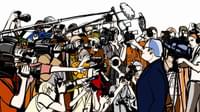
The Art of the Political Interview
Sean Walsh argues that for an interview to be more than an effort in verbal confrontation it needs to be more like a conversation – a facet lost on John Humphrys.
So now we know: David Davis was the patsy, the unwitting conscript in an egregious and disgusting act of political bad faith. Having been made guardian to a perfectly healthy Brexit, Mrs May chose to place it on a morphine drip and gradually up the dose. In doing so she treated the primary carer, Mr Davis, with contempt. Following his resignation (and as is the protocol in these things) Mr Davis offered his first interview to the Today program, who then asked him, repeatedly, the really big question: why hadn't he resigned on Friday night instead of Sunday night?
Huh?
Here is the interview timeline: at 8.10am we knew that Davis had resigned; at 8.15am we knew that he had still resigned; at 8.20am we were wondering why John Humphrys hadn't resigned.
One wonders how Mr Humphreys would have handled an exclusive interview with the Risen Lord on the first Easter Day. "If I could just stop you there…many people will be wondering why having been crucified on Friday you left it until Sunday morning to be raised from the dead. What has changed? You knew on Friday lunchtime you were dead, why no resurrection then?".
Does it matter? That depends on what you take the purpose of such an interview to be. If it's just a sort of schtick then fine, no problem. But too often we are told by political journalists that they go personal in order to submit the hypocrisies of politicians to the harsh light of truth. But time and again they show they have no understanding either of "hypocrisy" or "truth". Hypocrisy is not inconsistency over time. Nor is it reducible to the universal human failing of not living up to some moral ideal. Hypocrisy is about wearing a mask. It is when a person deliberately fails to join up the behaviours they enact with the behaviours they prescribe. It is a failure to order one's interior moral landscape according to one's external actions. The politician who smoked dope at university and now refuses to legalise it is not a hypocrite. The journalist who parades his belief in openness on a Sunday morning tv programme and then rushes to the High Court for a reporting injunction most certainly is.( That last is hypothetical, of course). Journalists rarely seem to get this. Instead, the journalistic culture is one in which very trivial instances of human frailty are elevated to a significance they don't deserve.
And as for "truth", it is not, to be frank, the natural subject matter of journalism. The more that the political journalist attempts a "factual account" of the here and now the more he relativizes that account to the contingencies of the present moment. The account may be "true" in some uninteresting way, but will involve a flight away from the arc of history. There is an analogy to be made with an individual human life. A detailed account of all that I'm doing today will be true in a sort of way, but it will not be fully understood unless placed within the context of my life overall.
For an interview to be more than an exercise in schtick it needs to be more like a conversation. When a person says "I lost myself in conversation" it is because they lost their self in that conversation. The best conversation is one in which the egos of the interlocutors recede, pride is replaced by humility, and the discussion thereby acquires its own rhythm and internal dynamic. In a situation like that truth -in a meaningful sense- has a chance of breaking through. The 19th existentialist Soren Kierkegaard suggested that truth emerged through the ebb and flow of such a dialogue. I remember some years ago Bryan Magee's wonderful series of discussions of The Great Philosophers. These discussions could be tetchy because philosophers have egos too (AJ Ayer was a guest, for goodness sake). And possibly alcohol, an essential ingredient in the generation of exciting philosophy in my experience, could have been thrown into the mix. But on occasion ego gave way to love of Sophia and the viewer saw that something real was at stake. Something that I suspect has but rarely made itself known on the Today programme.
The political interview is never like that. It is ego competitive and not ego transcendent. That's fine if we accept that it's mere theatre and that as theatre it's more Brian Rix than William Shakespeare.













